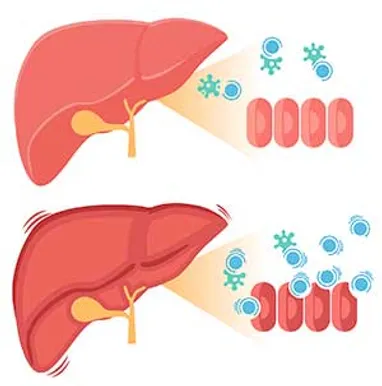FAQ
Learn answers to frequently asked questions about autoimmune hepatitis (AIH).
Will I need a liver transplant or die early from this disease?
Patients being treated for AIH do well long-term, and most will never need a liver transplant. In a diverse group of patients (including patients of advanced age), 91% are still living after 10 years, and 70% are still living after 20 years without liver transplants.
How will this disease affect me?
Patients report a wide variety of symptoms from AIH and side effects from the medications they take to control the disease. Some patients experience no symptoms at all, while others suffer from several that negatively impact their lives.
How quickly should my liver enzymes return to normal?
Everyone is different; however, a general guideline is that with treatment, liver tests (AST and ALT) should be near normal or normal within six months of diagnosis.

How often should I receive blood work to monitor my liver enzymes?
Laboratory values are followed frequently in the months after diagnosis. These tests may be completed as frequently as every week to every month. Frequency may depend on factors such as the severity of your liver inflammation, dose of medications, your symptoms, and your doctor’s comfort level. Over time, if liver tests are normal or stable, it is common to lengthen the time in between laboratory testing to every three to six months.
What blood work should I receive regularly to monitor my AIH?
Common blood work includes:
- Complete blood cell count (CBC): This lab ensures immunosuppression medication is not overly suppressing the bone marrow. Bone marrow is the source of all blood cell types.
- Complete metabolic panel (CMP) or components of the CMP such as a hepatic function panel (AST/ALT/alkaline phosphatase/total bilirubin): These labs are used to monitor electrolytes, renal function, and liver tests. Liver tests (AST/ALT) found within the CMP or hepatic panel are how doctors monitor the level of liver inflammation.
- Immunoglobulin G (IgG): This lab can reflect ongoing liver inflammation related to AIH.
What does it mean if my liver tests don’t return to normal within six months?
Liver tests not returning to normal within six months may indicate a few things. It could be that your AIH may require a more intensified immunosuppression regimen, such as multiple medications or higher doses. It could also indicate you have another liver condition in addition to AIH that is contributing to ongoing liver inflammation. Other conditions could include viral hepatitis, fatty liver disease, Wilson’s disease, drug-induced liver injury, or other autoimmune liver diseases (primary biliary cholangitis or primary sclerosing cholangitis).
Should I see a hepatologist instead of a gastroenterologist?
Either may be fine; however, the treating doctor should have experience treating patients with AIH. Hepatologists affiliated with liver transplant centers are likely more knowledgeable about harder-to-treat AIH patients.

Will my children or other family members also get AIH?
It is very unlikely. Research suggests that a first-degree relative (mom, dad, or a sibling) of an AIH patient has <1% chance of developing AIH.
Autoimmune diseases, on the other hand, are often common within families. 50% of AIH patients have a first-degree relative with an autoimmune disease.
Up to 45% of AIH patients have or will develop at least one additional autoimmune disease besides AIH.
